
THE VOICE OF INTERNATIONAL LITHUANIA
|
VilNews has its own Google archive! Type a word in the above search box to find any article.
You can also follow us on Facebook. We have two different pages. Click to open and join.
|
Archive for September, 2011
- Posted by - (0) Comment
VilNews had 100.000 visits in 6 months!
VilNews has been online for a little over six months now. When we started, our goal was to reach 100 000 visits in ONE year. Experts thought we were kidding. The fact is that we reached the target in just six months!
Thanks to you, dear readers!
Among the things we're going to focus on this autumn and winter, is to tell you more about this nation's relations with other countries around the world. For better or worse. Open, forthright talks will still be our standards.
Please write us with your ideas and comments!
The illustrations below show some characteristics of the nations we will cover, things that make them known here, presented in Lithuania’s flag colours.
 ARTICLE NO. 1 HUNGARY |
 ARTICLE NO. 2: ITALY |
 ARTICLE NO. 3: KARAIMS |
|
 ARTICLE NO. 4: DENMARK |
 ARTICLE NO. 5: JAPAN |
 ARTICLE NO. 6: CANADA |
|
 ARTICLE NO. 7: ARTICLE NO. 7:GERMANY |
 ARTICLE NO. 8: CHINA |
 ARTICLE NO. 9: INDIA |
|
 ARTICLE NO. 10: SWEDEN |
 ARTICLE NO. 11: TATARS |
 ARTICLE NO. 12: USA |
|
 ARTICLE NO. 13: RUSSIA |
 ARTICLE NO. 14: BELARUS |
 ARTICLE NO. 15: ICELAND |
|
 ARTICLE NO. 16: TURKEY |
|
 ARTICLE NO. 18: THE UK |
|
 ARTICLE NO. 19: NORWAY |
 ARTICLE NO. 20: POLAND |
 ARTICLE NO. 21: FRANCE |
|
|
|
ARTICLE NO. 22: THE LITVAKS (LITHUANIAN JEWS) |
||
Lithuania has an amazing 700-year history as an international melting pot. This has been especially evident since 1323, the year Grand Duke Gediminas founded Vilnius as Lithuania’s capital city and immediately decided to invite merchants, craftsmen, bankers, farmers, and soldiers from all Europe to come to the new capital, guaranteeing all freedom of beliefs and good working conditions. Vilnius became international, though with less of German or Scandinavian influence, as one could expect, rather influenced by Italy and Mediterranean ideas – greatly different from the other two Baltic capitals where Hanseatic influence became dominant.
VilNews will over some time this autumn publish articles about impacts of foreign nations and cultures here. We also welcome you, dear readers, to share with us information you may have about ‘foreign footprints in Lithuania’.
CLICK HERE TO READ ON WHITE BACKGROUND…
- Bookmark :
- Digg
- del.icio.us
- Stumbleupon
- Redit it
- Posted by - (2) Comment
VilNews had 100.000 visits in 6 months!
VilNews has been online for a little over six months now. When we started, our goal was to reach 100 000 visits in ONE year. Experts thought we were kidding. The fact is that we reached the target in just six months!
Thanks to you, dear readers!
Among the things we're going to focus on this autumn and winter, is to tell you more about this nation's relations with other countries around the world. For better or worse. Open, forthright talks will still be our standards.
Please write us with your ideas and comments!
The illustrations below show some characteristics of the nations we will cover, things that make them known here, presented in Lithuania’s flag colours.
 ARTICLE NO. 1 HUNGARY |
 ARTICLE NO. 2: ITALY |
 ARTICLE NO. 3: KARAIMS |
|
 ARTICLE NO. 4: DENMARK |
 ARTICLE NO. 5: JAPAN |
 ARTICLE NO. 6: CANADA |
|
 ARTICLE NO. 7: ARTICLE NO. 7:GERMANY |
 ARTICLE NO. 8: CHINA |
 ARTICLE NO. 9: INDIA |
|
 ARTICLE NO. 10: SWEDEN |
 ARTICLE NO. 11: TATARS |
 ARTICLE NO. 12: USA |
|
 ARTICLE NO. 13: RUSSIA |
 ARTICLE NO. 14: BELARUS |
 ARTICLE NO. 15: ICELAND |
|
 ARTICLE NO. 16: TURKEY |
|
 ARTICLE NO. 18: THE UK |
|
 ARTICLE NO. 19: NORWAY |
 ARTICLE NO. 20: POLAND |
 ARTICLE NO. 21: FRANCE |
|
|
|
ARTICLE NO. 22: THE LITVAKS (LITHUANIAN JEWS) |
||
Lithuania has an amazing 700-year history as an international melting pot. This has been especially evident since 1323, the year Grand Duke Gediminas founded Vilnius as Lithuania’s capital city and immediately decided to invite merchants, craftsmen, bankers, farmers, and soldiers from all Europe to come to the new capital, guaranteeing all freedom of beliefs and good working conditions. Vilnius became international, though with less of German or Scandinavian influence, as one could expect, rather influenced by Italy and Mediterranean ideas – greatly different from the other two Baltic capitals where Hanseatic influence became dominant.
VilNews will over some time this autumn publish articles about impacts of foreign nations and cultures here. We also welcome you, dear readers, to share with us information you may have about ‘foreign footprints in Lithuania’.
- Bookmark :
- Digg
- del.icio.us
- Stumbleupon
- Redit it
Lithuania says forget Russia reset
- Posted by - (0) Comment

29 September 2011
The Associated Press
VILNIUS, Lithuania — Russia's decision on its leadership change next year has effectively buried any hopes of a renewal of relations with the West, Lithuania's prime minister said.
"No one should have illusions about how Russia will be ruled for decades to come," Andrius Kubilius told Lithuanian Radio.
Lithuania is among Russia's harshest critics in the European Union and NATO.
On Saturday, Prime Minister Vladimir Putin announced that he had decided to reclaim the presidency next year, setting up the possibility that he could rule Russia until 2024. In nominating Putin, his United Russia party also approved his proposal that President Dmitry Medvedev take over Putin's current role as prime minister.
Read more:
http://www.themoscowtimes.com/news/article/lithuania-says-forget-russia-reset/444486.html#ixzz1ZLvK8cDg
The Moscow Times
- Bookmark :
- Digg
- del.icio.us
- Stumbleupon
- Redit it
How many crosses on ‘Hill of Three Crosses’?
- Posted by - (1) Comment

Photo: Wikipedia.org.
By KR Slade
The hill behind the castle tower in the Old Town of the city of Vilnius--the capital of Lithuania, is called ‘The Hill of Three Crosses’. So, how many crosses are on the Hill of Three Crosses ? Six ! Or nine, if you count shadows . . .
In the 14th century, according to legend, pagans killed seven Franciscan monks on this hill. Three monks were hung on the hill, and four were thrown in the river. Three wooden crosses were erected on this hilltop in the 17th century. Thus, the hill got its name.
In 1916, before the first Republic of Lithuania (1918-1939), the wooden crosses were replaced with an ensemble of three, more monumental, reinforced-concrete crosses. They were hollow, about two feet square and about three inches thick. The cross-arms span about eight feet; the height is about eighteen feet. The three-dimensional relief faces reflect light and shadow.
In 1950, the Soviets blew-up and buried the three concrete crosses, which are now placed on the ground just below the final summit climb of the hill. The old, raw concrete crosses are in-tact, but broken at their bases that expose their steel reinforcement rods . The twisted steel rods evidence an amount of force used in their attempted ruin. Amazingly, they were not completely destroyed. They remain now triumphant, on the ground, the paint long-since worn away by weather, neatly displayed on a grassy presentation, about fifty feet from the summit. The three recumbent crosses, still working in their retirement, make a resurrected statement of faith.
The newer three crosses, which since 1989 crown the hilltop vista, were constructed according to the previous general plans. But, there are visible differences in the frontal surfaces of the older and newer structures. In 1991, Soviets here became extinct.
I had mentioned to a local friend that I wanted to go to the Hill of the Three Crosses. He replied, “Why? It’s a hill. With three crosses. You can see the crosses from everywhere in the city.”
No. The Hill of Three Crosses has six crosses. Yes, you can see the three crosses from everywhere in the Old Town. But it’s the other three crosses--the one’s resting on the ground--the old retired ones, which vividly tell the whole story.
- Bookmark :
- Digg
- del.icio.us
- Stumbleupon
- Redit it
How many crosses on ‘Hill of Three Crosses’?
- Posted by - (2) Comment

Photo: Wikipedia.org.
By KR Slade
The hill behind the castle tower in the Old Town of the city of Vilnius--the capital of Lithuania, is called ‘The Hill of Three Crosses’. So, how many crosses are on the Hill of Three Crosses ? Six ! Or nine, if you count shadows . . .
In the 14th century, according to legend, pagans killed seven Franciscan monks on this hill. Three monks were hung on the hill, and four were thrown in the river. Three wooden crosses were erected on this hilltop in the 17th century. Thus, the hill got its name.
In 1916, before the first Republic of Lithuania (1918-1939), the wooden crosses were replaced with an ensemble of three, more monumental, reinforced-concrete crosses. They were hollow, about two feet square and about three inches thick. The cross-arms span about eight feet; the height is about eighteen feet. The three-dimensional relief faces reflect light and shadow.
In 1950, the Soviets blew-up and buried the three concrete crosses, which are now placed on the ground just below the final summit climb of the hill. The old, raw concrete crosses are in-tact, but broken at their bases that expose their steel reinforcement rods . The twisted steel rods evidence an amount of force used in their attempted ruin. Amazingly, they were not completely destroyed. They remain now triumphant, on the ground, the paint long-since worn away by weather, neatly displayed on a grassy presentation, about fifty feet from the summit. The three recumbent crosses, still working in their retirement, make a resurrected statement of faith.
The newer three crosses, which since 1989 crown the hilltop vista, were constructed according to the previous general plans. But, there are visible differences in the frontal surfaces of the older and newer structures. In 1991, Soviets here became extinct.
I had mentioned to a local friend that I wanted to go to the Hill of the Three Crosses. He replied, “Why? It’s a hill. With three crosses. You can see the crosses from everywhere in the city.”
No. The Hill of Three Crosses has six crosses. Yes, you can see the three crosses from everywhere in the Old Town. But it’s the other three crosses--the one’s resting on the ground--the old retired ones, which vividly tell the whole story.
- Bookmark :
- Digg
- del.icio.us
- Stumbleupon
- Redit it
Lithuania to start closing universities?
- Posted by - (0) Comment
![]()

The Lithuanian government is “not ambitious” enough in executing its target for reducing the budget deficit to below 3 percent of gross domestic product next year, said Mindaugas Leika, chief economist at Lithuania’s central bank.
The government should expand wealth taxation by introducing taxes on real estate to boost revenue, Leika said in a video interview with the magazine IQ published on its website. It should also increase the fight against the “shadow economy” and boosting efficiency at state-owned companies, he said.
The government is aiming to narrow the 2012 budget shortfall to 2.8 percent of GDP next year from an estimated 5.3 percent shortfall this year. The Cabinet must submit its 2012 budget plan to the parliament by Oct. 17.
Lithuania should consider closing some of its 23 universities to help trim budget spending and raise the quality of the education system, Leika said.
Reducing health-care benefits for the wealthy may also help balance the budget, he said.
Read more at:
http://www.bloomberg.com/news/2011-09-26/lithuania-government-not-ambitious-with-budget-economist-says.html
- Bookmark :
- Digg
- del.icio.us
- Stumbleupon
- Redit it
- Posted by - (0) Comment
| The article ‘Crime and decay’ was first published in our VilNews newsletter last year. The below letters to the editor were received in response to it. |
GREAT ARTICLE IN VILNEWS!

I really liked the latest article in VilNews. But you know, the problem is not only in the small villages of Lithuania. How often do you see Police patrolling in the old town? Where are the police of this country?
Gene Emmer
Vilnius
- Bookmark :
- Digg
- del.icio.us
- Stumbleupon
- Redit it

Yet again, a very interesting and unfortunately a very accurate depiction of the situation in Lithuania. I have had the exact same experiences that you had mentioned. I remember first coming to Lithuania about 10 years ago and the Lithuania then, is definitely not the Lithuania now!
I remember when it was relatively safe to walk in almost any corner of Lithuania, without the fear that I had, in my own country (South Africa). However, on our recent visits, I was advised not to stroll around as freely as I did previously. To the extent, of being escorted wherever I went. I also recognised the development in the major cities and the degradation on the outskirts and villages. How could this happen in a country, where there was once so much of national pride!
I genuinely miss the days of looking at Lithuania, as my second home country, in a very fond light. My wife and children are Lithuania citizens and I would love for my wife and children to continue to be proud Lithuanians! I also want them to have the same romantic view I have had of Lithuania!
Our family and friends in Lithuania are off the same mind set as your dear friend. Where the country has gained internationally, from being included in the EU and NATO, it has lost domestically, by allowing its' people to lose faith. In almost every conversation I have encountered, the central topic was around corruption. This corruption ranges from low level public sector workers to the upper echelons of government.
My view is that the people have THE VOICE! However, when I mentioned this approach to people, I was almost laughed at!
The issue is that the nature of most of the people I have encountered is that the best approach, is to accept the situation as it is. No amount effort on my part could convince them, that they are empowered to take action.
For example: There is a prevalence of bribery in most state departments, especially when it comes to applications or documents, etc. In most cases, a time frame is indicated within which you should receive the
information, however, the norm is that if you bribe the person, only then would you get the information with that timeframe. Failure to bribe, will result in "delays". Now, my approach, is that a person should say NO to anyone who suggests or tries to extract a bribe. My family's view is that it has now become the norm and it is expected for you in some cases to offer the bribe!
I was very irritated by that revelation and expressed a situation to them, which I was hoping would change their perspective.
As you are aware, I am a South African, and I will relate an experience where I realised that sometimes, escalating an issue does resolve the matter. I was experiencing issues with getting a visa to visit Lithuania, despite having visited the country on numerous occasions prior to that. I was met with comments and replies which made no sense and was not complimentary to the visa issuing policies. When I highlighted this to the consular officer, I was met with an irrelevant reply, which intended to insult my appreciation of the English language. I decided to voice my irritation of the situation via an online forum which I found on the Office of the Presidents' website. I did this without any expectation. Much to my delight, I received a reply within 24 hours! The office of the President, accepted that my treatment was unfair and forwarded my details to the Ministry of Foreign Affairs. Within an hour of that initial mail, I received a mail from the Ministry of Foreign Affairs, requesting all my details as well as the details of the consulate and consular officer. Within that same day, I received another mail from the Ministry of Foreign Affairs and they had given me assurance that my visa application will be handled in the proper manner and will be issued within the timeframe, described in their visa issuing policy! Needless to state, when I presented myself at the consulate for the collection of my visa, I was met with a very apologetic consular officer as well as having my visa issued more sooner than I had expected. So, it does help to escalate and it does not go unattended!
The response from my family was that this was only done because I was a foreigner. They believe that if they had to do the same, that they would be ridiculed! I respectfully disagreed!
I believe that the way out of this proverbial 'hole' that is being dug, is to empower the people, with forums or support groups, independent of any attachment to government, which will ensure that the faith and trust that should exist, and be available, are there and is being used for what it is intended!
I am willing to lend whatever support I can, to form a lobby group, or to join an existing lobby group, to get a forum in place to address these issues with government in a diplomatic environment, expressing the concerns that we as foreigners (by Nationality only, as I see Lithuania as my second Home country) have!
I think that every single Lithuanian, should remember these names below and the cause that they sacrificed their lives for on January 13, 1991!
Loreta Asanavičiūtė, Virginijus Druskis, Darius Gerbutavičius, Rolandas Jankauskas, Rimantas Juknevičius, Alvydas Kanapinskas, Algimantas Petras Kavoliukas, Vytautas Koncevičius, Vidas Maciulevičius, Titas Masiulis, Alvydas Matulka, Apolinaras Juozas Povilaitis, Ignas Šimulionis, Vytautas Vaitkus
Let not let THEIR sacrifice be in vain!
Come on Lithuania! Be proud! Remember Baltijos kelias! Anything is possible if you put your heart and soul into it! Democracy does prevail!
Eugene Rangayah
South Africa and United Kingdom
- Bookmark :
- Digg
- del.icio.us
- Stumbleupon
- Redit it
Not professional journalism
- Posted by - (0) Comment
I was severely shocked by the latest edition. That is not professional journalism. No effort was made for the police commissariat to rebut or clarify your statement. Yet you use their emblem at the top of the page. You avoid libel by putting the attack on the police in her words, that ‘many of them probably get a share of the cake from many theft and assaults…’ instead of yours.
Think about it. Rural tourism is big business in Lithuania but after reading your piece, I would immediately cancel any plans to visit a village. In actuality, it may even be safer, since back in 1995, they were torturing pensioners to death so that they would disclose where they had hidden a couple hundred litas. I have not heard of that going on recently.
But you do not have to go to the village to have this problem. The criminals come into Vilnius on the train, carry out nasty crimes in the vicinity of train station, and then leave before the police can catch them.
You talk about the president addressing the problem. She is more concerned with foreign policy than domestic. Aside from signing laws and appointing the head of the various government organisations, like the police commissariat, she really has little domestic power. She does not have the right to introduce legislation or work it through the Seimas. So what are you expecting her to do? Why are you unnecessarily raising dissatisfaction with our government? People have enough trouble trusting it and the various officials without fruitless attacks.
And what is at the core of this problem? It is that we have lots of people without work or hope of work. These are the people turning to crime. But the state does not have money to increase unemployment benefits. It does not have money for retraining workers. And the thieves do not really care whether the state feeds them or crime does. Furthermore, the current drive in EU policy, which strongly influences our laws, is to reduce penalties for theft and assault and to increase prevention, including using home arrest instead of jail time.
That some police officers are turning a blind eye for a piece of the pie is almost sure to be true. But to give that as the reason for state-wide ‘incompetence’ is absurd. This was a wonderful, lost opportunity to show that you get what you pay for. The police are woefully underpaid and under-financed. A comparison of Lithuanian financing with that of neighbouring countries and the EU, adjusted for cost of living, would have been fantastic. Furthermore I think the police took a cut in pay when the crisis hit. I remember the medical and fire fighting staffs protesting. You also did not show how many officers have lost their lives in the line of duty.
As to your statistic that around half the cases are not investigated, it is taken out of context. Some anecdotal evidence might clarify the point. My friend has been robbed three times. One time his telephone was taken out of his backpack on a crowded bus. He didn’t see it happen and so he can’t identify the culprit. Fabric does not retain fingerprints. Without evidence, the police have no right to search someone, as if they could find a random passenger from the no. 5 trolley two hours after he got off. The second time, a little old lady picked his pocket at the cash register in a provision shop. Since she did not rob the shop, they were not interested in co-operating. Since it was a little old lady who could not really be sent to jail or ordered to pay a fine (She’s stealing because she can’t pay her bills now.) and because the judge would find the victim guilty of negligence, there was no need to investigate as it would have been a fruitless waste of taxpayers’ money. The third time his basement was robbed. His son had let his friends know he kept a nice bike down there and one of them helped himself to it. Fingerprints do not last for more than 24 hours in most cases and basement surfaces are rough, making fingerprints hard to acquire even if reported immediately. So how were the police supposed to investigate these crimes? And why should they?
When Simone wandered off in Trakai, the police made a concerted effort to find her and did so within half an hour. We offered them a reward, but they refused, saying a good word now and then would be a better sign of appreciation. Twice our neighbour broke out our car window. The first time, too much time had passed and no fingerprints were left. The second time, a neighbour let us know immediately, a print was obtained, and they found the culprit, whose mother was forced to pay for replacing the second window. She also took measures so that the situation never occurred again. Another time, a gang was terrorising our building and finally our neighbours caught them. We helped hold the culprits until the police came. Since they were minors and no material harm had been done (just faeces smeared on the walls), no retribution or repayment was ever made, but they have left our building alone since then. Another time about 20 youths, male and female, were beating another youth up in our courtyard. We called the police but the gang left within minutes as they realised staying around was not in their best interest. We figured it was better they left the youth they were stomping alone than that the police surprise them in the act. We called the police back when the youths left so they would not waste time looking in the courtyard. I have no idea whether they caught any of them subsequently or not. Another time a young Scot went out to smoke a cigarette in an isolated spot near our house at 2 am and was raped. No one responded to hereinafter referred to as the cries for help. She did not recognise the rapists and soon left the country in disgust. Once again, most of these situations are beyond help. An investigation is just a waste of money. But we do not let our daughter wander outside freely like we both did as children.
These seems like a lot of crime for one short period. But please remember I live in a city of several hundred thousand people and there are literally hundreds in a stone’s throw of my home. With such population densities, it is no wonder that there is so much crime evident.
As to robberies, usually they are carried out by people living far away. The gang that was robbing the building of my friend mentioned above lived in Alytus. They were only caught because a dog started acting strangely and the owner called the police. They surrounded the area as these gangs are well organised. They have lookouts everywhere. As soon as the police approach, they are out of there. That day the police arrested all of them. End of problem.
I have noticed a drastic improvement in the quality of the police officers in the 14 years I have been in Lithuania. When I came here people who could not find work elsewhere often joined the police. Thus their intelligence was often low and their training abysmal. One felt sorry for the culprits when calling the police because it was rumoured that they often administered ‘justice’ themselves. You don’t hear such stories now. We called the police a few days ago to remove some homeless men from our stairwell and they treated the culprits with respect. They simply told the men to pack their things and leave. They spoke for a while, so I imagine they told them where to find free lodgings and food. Then they waited downstairs to see that the men actually left, rather than arresting them.
Next time, please tell the whole story instead of just adding to the problem.
Arturas Bakanauskas
Vilnius
- Bookmark :
- Digg
- del.icio.us
- Stumbleupon
- Redit it
- Posted by - (0) Comment
Small towns in today’s Lithuania:
CRIME AND DECAY
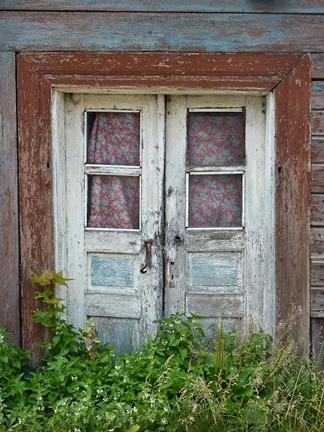
Text: Aage Myhre, VilNews Editor-in-Chief
Every third year or so I go to visit some acquaintances in one of Lithuania's small towns. A few days ago it was again time to see these exceptionally friendly, nice people, and my little family and I were as always very much welcome guests at the home of our small-town friends when we arrived at the gate in front of their house.
When we last were there, in 2007, this was a family and a society that seemed to be in peaceful harmony. A little sleepy, yet idyllic atmosphere prevailed in both the home and the small town at that time.
No longer so.
“Criminal gangs appear to be about to take over in such a way that we, the law-abiding citizens no longer feel safe neither in the streets nor in our homes. Last night, for example, we were out at a restaurant just ten minutes walk from our house. When it was time to go home, it was already dark outside, and as the situation here has become so bad over the past couple of years we dared not walk, we felt we had no other choice than to take a taxi the few hundred meters back to our home. "
She speaks softly, sad and with deep seriousness in her voice as she explains the situation to us, this gentle woman who has lived in this town all her lifetime. Here she gave birth to and raised her now grown children who have given her great grandchildren whom she talks about with great pride in her voice, still expressing deep concerns on how it will be for them to experience an environment like this during their years of childhood and youth.
- Bookmark :
- Digg
- del.icio.us
- Stumbleupon
- Redit it
- Posted by - (2) Comment
Small towns in today’s Lithuania:
CRIME AND DECAY
 |
 |
Many of Lithuania's small towns suffer from decay and increasingly severe crime cases
Text: Aage Myhre, VilNews Editor-in-Chief
Every third year or so I go to visit some acquaintances in one of Lithuania's small towns. A few days ago it was again time to see these exceptionally friendly, nice people, and my little family and I were as always very much welcome guests at the home of our small-town friends when we arrived at the gate in front of their house.
When we last were there, in 2007, this was a family and a society that seemed to be in peaceful harmony. A little sleepy, yet idyllic atmosphere prevailed in both the home and the small town at that time.
No longer so.
“Criminal gangs appear to be about to take over in such a way that we, the law-abiding citizens no longer feel safe neither in the streets nor in our homes. Last night, for example, we were out at a restaurant just ten minutes walk from our house. When it was time to go home, it was already dark outside, and as the situation here has become so bad over the past couple of years we dared not walk, we felt we had no other choice than to take a taxi the few hundred meters back to our home. "
She speaks softly, sad and with deep seriousness in her voice as she explains the situation to us, this gentle woman who has lived in this town all her lifetime. Here she gave birth to and raised her now grown children who have given her great grandchildren whom she talks about with great pride in her voice, still expressing deep concerns on how it will be for them to experience an environment like this during their years of childhood and youth.
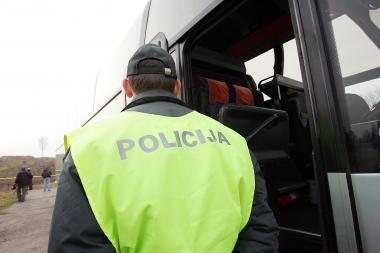
"Worst of all," the woman continues, "is that these criminals seem to no longer worry if they are being seen or discovered. Many break-ins in the houses around here happen in broad daylight, and it seems as if the police no longer have control of anything in our dear village.
A neighbour who came home to his house a few days ago was met outside his own front door by a stranger coming out of the house. ‘What are you doing here,’ our neighbour asked. ’ Well,’ replied the stranger, ‘what I had to do, I've already done.’ When our neighbour went in, he understood what the stranger had meant. The house was just completely stripped of all valuable items."
When I asked her what the police do in cases as the one she had just described, our acquaintance just scoffs. She no longer has respect for the police, judiciary or politicians in this country, she says, and more than suggests that many of them probably get a share of the cake from the many thefts and assaults taking place right in front of their noses.
I have, after we left our acquaintances, been trying to find out if the problems she describes about her hometown could also apply to other towns in this country. The answer is, unfortunately very discouraging, confirming that her hometown is not unique with regard to rapidly increasing crime and lack of respect for law and order.
What can we do to make life for this proud, bright woman and the many other law-abiding people around this great country a little safer and brighter again?
It is not up to me to answer, but both our President and our Prime Minister should take this problem seriously before the situation gets even more out of control.
The cancerous tumour is growing every day that passes...
The visit to our acquaintances in one of Lithuania's many small towns made a strong impression on me. When we drove out of town I saw in a new light the buildings, streets and the few people who were out this late afternoon. I saw that my former somewhat romantic view of this rural town was wrong. Or at least not complete. I saw that many of the houses were in decay and that very little had happened since I first came here 20 years ago.
And when I think about it, isn’t this the situation for the majority of Lithuania's small towns? They have not received their fair share of EU funds or investments that made Vilnius and partly the other major cities flourish.
Heritage is about to be lost. Buildings and outdoor environments disintegrate. People are suffering. Criminal gangs are gaining better footholds.
Is this the Lithuania we want to have? Of course not. But it is now. We, the people care about this country, living here or elsewhere on the globe, must begin to take action. It's all up to us, is it not?
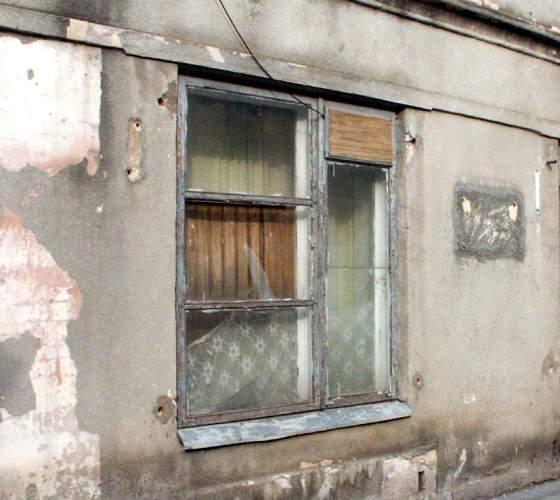
- Bookmark :
- Digg
- del.icio.us
- Stumbleupon
- Redit it
Siberian monster
- Posted by - (0) Comment
![]()
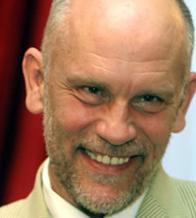
(AP) VILNIUS, Lithuania — John Malkovich says his latest acting role, an aging Siberian mobster trying to raise his grandson to be an honorable crook, proved to be a "delightful" experience.
The movie, "Siberian Education," is set in Trans-Dniester, now a separatist republic between Moldova and Ukraine, though filming of the U.S.-Italian production took place in Lithuania and wrapped up this week.
Malkovich plays Kuzja, an old recividist exiled to Trans-Dniester along with numerous other ex-convicts by Soviet authorities in the waning years of the Soviet Union. Kuzja tries to teach his grandson Kolyma — the film's main protagonist, played by Lithuanian actor Arnas Fedaravicius — the arcane rules of "criminal morals."
"It is an interesting story about the way of life that most of audience would not know about," Malkovich said Friday before leaving Lithuania. "Things are so much global and Americanized. It's interesting to think of that kind of (criminal) culture that the film addresses is kind of becoming extinct."
"I found this experience delightful," he added.
Read more at:
http://www.cbsnews.com/stories/2011/09/24/ap/entertainment/main20111117.shtml
- Bookmark :
- Digg
- del.icio.us
- Stumbleupon
- Redit it
- Posted by - (0) Comment
Because of the Jewish Holocaust during the Second World War Lithuania lost over 90 per cent of the Jewish community. In 1994, 23 September was declared National Memorial Day for the Genocide Victims of the Lithuanian Jews to commemorate the liquidation of the Vilnius Ghetto on that day in 1943. Many events are held to commemorate 23 September in different institutions of Lithuania every year. |
I just want respect
for murdered Jews
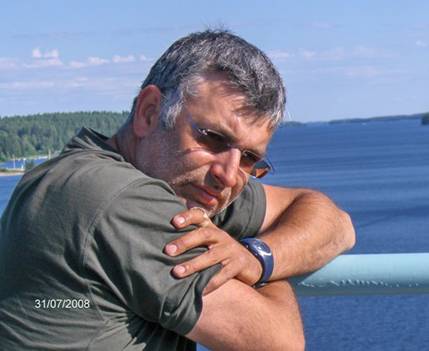
Sergejus Kanovičius
OPINION: By Sergejus Kanovičius
Very recently I looked at the Delfi.lt webpage and could barely hold back the tears watching one of the episodes of Mission Siberia (http://tv.delfi.lt/video/ST5zL0DJ) which aired this year, an interview with Lithuanians who have lived [in Siberia] eight decades now, unable to speak Lithuanian and explaining why they who have lived their entire lives in Siberia see no sense nor opportunity to return to Lithuania…I was saddened because of the tragedy of their lives, but at the same time I was glad that they are alive and healthy.
I remember how one of my best friends, the poet Liudvikas Jakimavicius, used to tell me during long evenings at his farm about the oppressions his family experienced, how his parents shared one cattle wagon with a Jewish boy named Harry, whom everyone called Garik. How Joske who spent the years of exile together with Liudvikas’s family, always used to send packages from far-off Israel with instant coffee and other items unavailable in the dying Soviet empire.
I told Liudvikas about my almost completely butchered family. It was painful for both of us, we empathized with one another and tried to understand the other’s pain and shared our grief until his pain and heartbreak became my pain, and the suffering he and his family experienced became mine as well.
- Bookmark :
- Digg
- del.icio.us
- Stumbleupon
- Redit it
- Posted by - (2) Comment
Because of the Jewish Holocaust during the Second World War Lithuania lost over 90 per cent of the Jewish community. In 1994, 23 September was declared National Memorial Day for the Genocide Victims of the Lithuanian Jews to commemorate the liquidation of the Vilnius Ghetto on that day in 1943. Many events are held to commemorate 23 September in different institutions of Lithuania every year. |
I just want respect
for murdered Jews

Sergejus Kanovičius
OPINION: By Sergejus Kanovičius
Very recently I looked at the Delfi.lt webpage and could barely hold back the tears watching one of the episodes of Mission Siberia (http://tv.delfi.lt/video/ST5zL0DJ) which aired this year, an interview with Lithuanians who have lived [in Siberia] eight decades now, unable to speak Lithuanian and explaining why they who have lived their entire lives in Siberia see no sense nor opportunity to return to Lithuania…I was saddened because of the tragedy of their lives, but at the same time I was glad that they are alive and healthy.
I remember how one of my best friends, the poet Liudvikas Jakimavicius, used to tell me during long evenings at his farm about the oppressions his family experienced, how his parents shared one cattle wagon with a Jewish boy named Harry, whom everyone called Garik. How Joske who spent the years of exile together with Liudvikas’s family, always used to send packages from far-off Israel with instant coffee and other items unavailable in the dying Soviet empire.
I told Liudvikas about my almost completely butchered family. It was painful for both of us, we empathized with one another and tried to understand the other’s pain and shared our grief until his pain and heartbreak became my pain, and the suffering he and his family experienced became mine as well.
If not for Liudvikas, I probably never would have written:
- Amber by the Laptev Sea
- There far far far away
- Not seen from here
- Over mountains over seas
- A lonely man laments
- A lonely seeker of truth
- Dug for what he hadn’t discarded
- Found what he hadn’t sought
- The cold sea laps
- eternal eternal ice
- frightened dreams of childhood
- give me some bread
- and some warmth
- and a little bit of motherland
- frozen to eternity sea
- returns to a son
- the blue scarf of his mother
- and father’s ice frozen boots
- when polar night is over
- the generous Laptev
- on eternal snow
- washes down to his feet
- mama’s amber beads
When I was in sixth grade, I, with hundreds of other boys of Lithuania, went through a selection and was chosen for inclusion in one of the best musical ensembles during the Soviet period, the Azuoliukas choir.
Many years would pass until I found out that when singing famous “Kregzdutes, Kregzdutes” by Balys Dvarionas (who spoke Yiddish perfectly with my dad) will be conducted by that boy from the cattle wagon, who became from Garik to Herman Perelstein.
And again I’m watching that interview from Mission: Siberia. I pose a macabre question to myself and fate: well, why, why is it better sometimes to be assaulted, raped, with destiny destroyed, but alive? Maybe because a living person is like a flower, [it] reaches towards sun and life, tries to blossom under any conditions, even the most inhuman, and tries to stay a human being. Because even when everything is taken away—country, property and a life that took hundreds of years to build—there is that something which remains, but what was taken from the rest of Garik’s family forever: life.
How I wish, how I lust to travel to Paneriai, to hundreds of Lithuanian towns, villages and churchyard settlements and mass graves hidden in their woods with friends, with people who think the same way, with a microphone and a video camera, to knock on the moss and get interviews from all of them.
Red equals brown. A little. Somewhat. Not much. Just a bit. There were two genocides. It is horrifying, an authoress wrote, at the Genocide Museum, at Tuskulenai where there …. murdered… innocent people… This desire to have “a genocide of one’s own” seems foolish to me. Just “borrow” some of the one that left my father with no relatives. So many people who count the murdered place them like weights on a balance. They weigh them. And still so many of my Lithuanian brothers today when they hear the word Holocaust beat their chests and say: Not us, not our responsibility.
Look at that that, I read, these unkosher Lithuanians, they are “freedom of thought police,” “intellectual taliban,” “leftists actively expressing themselves in the public space,” what do they think they’re doing, they dare say the simple truth, that brown does not equal red. Those who on the pyramid of ethnic patriotism vociferously demand “their own” cannot and will not accept this axiom. It would be interesting to watch two lawyers who try to convince one another that rape and homicide are crimes of a single cloth, and so must be judged and punished with the same punishments…
I am always reading: crucify them, crucify—either openly or with a little more reserve—but crucify.
And on the scales where on one side all my butchered family lies, they place on the other side what, Lucas (as if his opinion is the final unassailable word with opportunity for appeal and not to be criticized), Rubin, Stankeras, someone else, even using families who witnessed the terrors of Soviet crimes, eyes are counted and NKVD victims are placed [on the scales]. As if the scales would balance because of that pain and one could say, woohoo, now we, we too have OUR OWN genocide like you, so stop trying to interfere with your pain and suffering.
We, sorry, do not interfere. We, Jews, in general demand nothing in this sense and count nothing, we don’t write articles with horrifying examples of those of us who were rescued or did the rescuing in singles, because that would be nothing more than speculation [in the negative economic sense]. We were born AFTER THAT—with a wound that will not heal. And all we would like is that, out of politeness at least if not out of elementary human sympathy and compassion, they stop disturbing our victims and their memory and stop putting them on the scales. True, they will also put the Museum of Genocide Victims on the scales. The one where to our pain because of political reasons space was not found [for the Holocaust]. The only thing this building still needs is a sign: “600 meters to Jewish genocide” [reference to the only Holocaust museum in Lithuania, the Green House, hidden not far from the so-called Genocide Museum].
There, some activists say, you can find that, the other, theirs, not our genocide. But this is ours. Don’t touch it and don’t wave Jews around here. The heads of the Museum of Genocide Victims have even revealed that they came to an agreement with the Tolerance Center and Gaon Museum on novel new kinds of exchange: they don’t exhibit our genocide, we don’t exhibit theirs. Is that surprising? Is it surprising that such exchanges satisfy the leadership of the Tolerance Museum? And in some eyes, the scales again are balanced. Disgusting. Painful.
Later on the same scales they will place Rwanda, Cambodia (for some reason they’ve forgotten to mention this yet), Sudan, Katyn and ten other “examples” which while not doing so directly nonetheless say, your genocide is ‘sh…t.” Stankeras is not interesting as Stankeras. Stankeras is an expression of this red=brown and its logical product. He, like Azubalis on citizenship, said what many in this “I want my own genocide” hysteria truly think. Someone there, on the manor, [i.e., among the elite] decided that the nation and its patriotism needs to have “its own genocide.” So that without insulting anyone, without hiding historical facts, without meeting opposition from honest people, it is possible to expect Jews will accept this depreciation of their pain appropriately. Those Jews are inappropriate. Or maybe they’re appropriate. After all, if you think about it and admit it to yourself, it’s a miracle that they survived that meat grinder at all. They didn’t come back from Paneriaion trains, they didn’t rise up from the gas chambers and become living children again and didn’t live out what is called life, even if their destinies had been destroyed.
I don’t have objections how any people name their tragedies. I might not agree. But I have no moral right to tell them not to do that, to place their victims on scales and to become one of many who find it so much fun to take up the accounting of death.
I just want respect for murdered Jews. I want respect for the Lithuanians who rescued them. I don’t want any Lithuanian to beat his chest and publicly or privately declare “mea culpa.” Neither I nor you are to blame for what happened. You as I, as I and Liudvikas Jakimavicius, have only one duty: to judge what happened, thus taking responsibility not for crimes not committed by us, but responsibility so that our children and their children won’t have to write a multitude of articles and take up thankless work: weighing the pain of others. Lord, give eternal rest to the dead. We—Jews and Lithuanians—don’t need anything more than that.
And we don’t need to invite one another to the Museum of Genocide Victims, to Paneriai, or to Auschwitz; if we don’t have an inner need in ourselves to sympathize and forgive, no field trips will help. We are in the marketplace of the accountants of death where ever more often on the goods table of historical revisionism we hear the voice: “We had more!!! Our Self-Defense Battalions were great! Long live the heroes of the LAF!”
We can’t erase from history, no matter how paradoxical it is, the fact that a Lithuanian Jew on a cattle car on the way to Siberia and a Jew left in Lithuania did not have the same prospects and could not have had the same prospects.
One train with cattle cars travelled toward the vastnesses of Siberia in 1941. A few years later a train with Jewish children from Hungary moved out. One stopped at Ukhta. The other at Auschwitz. I tried to get an interview from those Hungarian children. Unfortunately, I was not able to.
I am extraordinarily thankful to fate that it didn’t leave Garik in Lithuania… The Azuoliukas [choir] sang so beautifully…
All attempts to discuss brown equal red with my butchered family seem to be totally senseless to me.
Mikhail Bulgakov said: “Manuscripts don’t burn.” In Lithuania’s case the Holocaust manuscript has not burned away, it is written in my large family’s blood.
So let there be two genocides if it helps Lithuania to overcome the deep national identity crisis. But if there are two genocides, two museums and two, rather than one pain and one, rather than two responsibilities for Lithuania of today and tomorrow, we will read new Stankerases, we will shrug our shoulders and we will wonder how in the world it is that we are so weak that even after twenty years of free thought and historical research what our uniform relationship is with the tragedy that took place in Lithuania which wiped off the map an entire ethnos—it is incredible that to the present day we are discussing this in [editorial opinion pieces]. I usually remain silent or silently pray at mass graves. Can’t we simply recognize that we are being dishonest to ourselves and others?
- Ghetto
- We came in the thousands
- We left in thousands
- Only single individuals returned
- Everyone lamented
- The Gesheft of centuries
- Children and the Talmud
- Were piled up at Paneriai
- And we sighed for the last time
- O beautiful my motherland
- Children of the Grand Duke
- The next day read loudly
- And Vilnius, and Vilnius
- And Vilnius finally has a ghetto
This contribution is an authorized adapted translation from:http://www.bernardinai.lt/straipsnis/2010-12-14-sergejus-kanovicius-interviu-is-paneriu-duobiu-arba-sveriame-mirti/54606
- Bookmark :
- Digg
- del.icio.us
- Stumbleupon
- Redit it
- Posted by - (0) Comment

Jews being marched from their ghetto in the centre of Vilnius (today’s Old Town) to the Paneriai (Ponary) forest outside the city for execution, 1942/1943. Paneriai is an area of wooded hills, where in 1941-1944 60,000 to 70,000 Jews from Vilnius were executed.
- Drawing by Fajwel Segal
What happened to the Jews in Lithuania during World War II is a matter of grim record. Of the 250.000 Jews in 1939, only between 12.500 and 17.500 survived; of those, only about 200 remain today.
It has been estimated that of the 265.000 Jews living in Lithuania in June 1941, 254.000 or 95% were murdered during the German occupation. No other Jewish community in Nazi-occupied Europe was so comprehensively destroyed.
The Red Army occupied Vilnius on 19 September 1939. Lithuania and the Soviet Union signed a treaty of mutual aid, in accordance with which Vilnius and the Vilnius region were returned to Lithuania. In 1940, Vilnius became the capital of Soviet Lithuania.
Vilnius remained under Soviet control until 26 June 1941, when the city fell to the invading German Army (Wehrmacht). On 8 July 1941 an order was issued stating that all Jews must wear a special patch on their back; subsequently they were ordered to wear the patch on their chest. In addition Jews were forbidden to walk along the main streets of the city, and shops were ordered to sell them food in limited amounts. Jewish people were fired from their jobs, deprived of the means of personal transportation and radios, forbidden to use public transport, and prohibited from public places. Jews were arrested on the streets, at their work places, and in their houses.
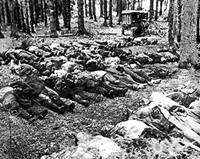
Paneriai forest near Vilnius.
Jewish victims of execution before the mass burial, 1943.
- Bookmark :
- Digg
- del.icio.us
- Stumbleupon
- Redit it
Lithuania among top five in global internet speed
- Posted by - (0) Comment
![]()

Lithuania ranks fourth among the world’s nations in terms of the Internet speed trailing only to South Korea, Romania and Bulgaria, Pando Networks, a US-based communication technology firm, said.
South Korea leads the list with the average download speed of 2,202 kilobytes per second, followed by Romania (1,909 Kbps) and Bulgaria (1,611 Kbps). Lithuania stood fourth with a 1,462 Kbps average download speed, the study by Pando Networks revealed.
The analysis was based on 27 million downloads by 20 million computers in 224 countries from January through June 2011.
The top ten also include Latvia (1,377 Kbps), Japan (1,364 Kbps), Sweden (1,234 Kbps), Ukraine (1,190 Kbps), Denmark (1,020 Kbps) and Hong Kong (922 Kbps). The world Internet speed average stood at 580 Kbps during the study.
- Bookmark :
- Digg
- del.icio.us
- Stumbleupon
- Redit it
VilNews e-magazine is published in Vilnius, Lithuania. Editor-in-Chief: Mr. Aage Myhre. Inquires to the editors: editor@VilNews.com.
Code of Ethics: See Section 2 – about VilNews. VilNews is not responsible for content on external links/web pages.
HOW TO ADVERTISE IN VILNEWS.
All content is copyrighted © 2011. UAB ‘VilNews’.

 Click on the buttons to open and read each of VilNews' 18 sub-sections
Click on the buttons to open and read each of VilNews' 18 sub-sections 


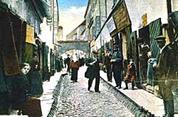















.jpg)



